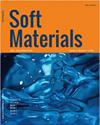Stabilization of magnetic fluid with polydimethylsiloxane kills three birds with one stone
IF 1.4
4区 材料科学
Q4 MATERIALS SCIENCE, MULTIDISCIPLINARY
引用次数: 1
Abstract
ABSTRACT The stability of a stabilized with polydimethylsiloxane (PDMS) magnetic fluid to alcohols of a saturated homologous series was investigated. We used alcohols with a linear molecular structure and their possible isomers. It was found that the solubility of the PDMS stabilized particles strongly depends on the molecular weight of the coagulant and, quite unexpectedly, on the degree of isomerization. The first tested coagulants, ethanol and acetone, did not mix with PDMS stabilized magnetic fluid. The next member of the homologous series, linear propanol, is the most effective coagulant that causes a sharp precipitation of particles. Meanwhile, with isopropanol, coagulation occurs very smoothly. The butanol isomers differ even more. Normal butanol causes the liquid to coagulate at a higher concentration than propanol, whereas tret-butanol mixes with PDMS stabilized magnetic fluid in any proportion. The last linear alcohol in the homologous series that can serve as a coagulant is hexanol-1. The next members of the homologous series do not mix with the PDMS stabilized magnetic fluid. This is typical only for linear molecules. For example, 2-ethylhexanol (isooctanol) perfectly dissolves PDMS stabilized particles. This property can be used to separate mixtures of isomers and linear molecules.用聚二甲基硅氧烷稳定磁流体一举三得
摘要研究了聚二甲基硅氧烷(PDMS)稳定磁流体对饱和同源系列醇的稳定性。我们使用了具有线性分子结构的醇及其可能的异构体。发现PDMS稳定颗粒的溶解度在很大程度上取决于混凝剂的分子量,出乎意料的是,还取决于异构化程度。第一次测试的混凝剂,乙醇和丙酮,没有与PDMS稳定的磁流体混合。同源系列的下一个成员,线性丙醇,是导致颗粒急剧沉淀的最有效的凝聚剂。同时,使用异丙醇,凝结非常顺利。丁醇异构体的差异甚至更大。正丁醇使液体以比丙醇更高的浓度凝结,而tret-丁醇以任何比例与PDMS稳定的磁性流体混合。同源系列中最后一种可以用作凝聚剂的直链醇是己醇-1。同源系列的下一个成员不与PDMS稳定的磁性流体混合。这只适用于线性分子。例如,2-乙基己醇(异辛醇)完全溶解PDMS稳定的颗粒。这种性质可用于分离异构体和线性分子的混合物。
本文章由计算机程序翻译,如有差异,请以英文原文为准。
求助全文
约1分钟内获得全文
求助全文
来源期刊

Soft Materials
工程技术-材料科学:综合
CiteScore
2.90
自引率
0.00%
发文量
21
审稿时长
2.2 months
期刊介绍:
Providing a common forum for all soft matter scientists, Soft Materials covers theory, simulation, and experimental research in this rapidly expanding and interdisciplinary field. As soft materials are often at the heart of modern technologies, soft matter science has implications and applications in many areas ranging from biology to engineering.
Unlike many journals which focus primarily on individual classes of materials or particular applications, Soft Materials draw on all physical, chemical, materials science, and biological aspects of soft matter. Featured topics include polymers, biomacromolecules, colloids, membranes, Langmuir-Blodgett films, liquid crystals, granular matter, soft interfaces, complex fluids, surfactants, gels, nanomaterials, self-organization, supramolecular science, molecular recognition, soft glasses, amphiphiles, foams, and active matter.
Truly international in scope, Soft Materials contains original research, invited reviews, in-depth technical tutorials, and book reviews.
 求助内容:
求助内容: 应助结果提醒方式:
应助结果提醒方式:


